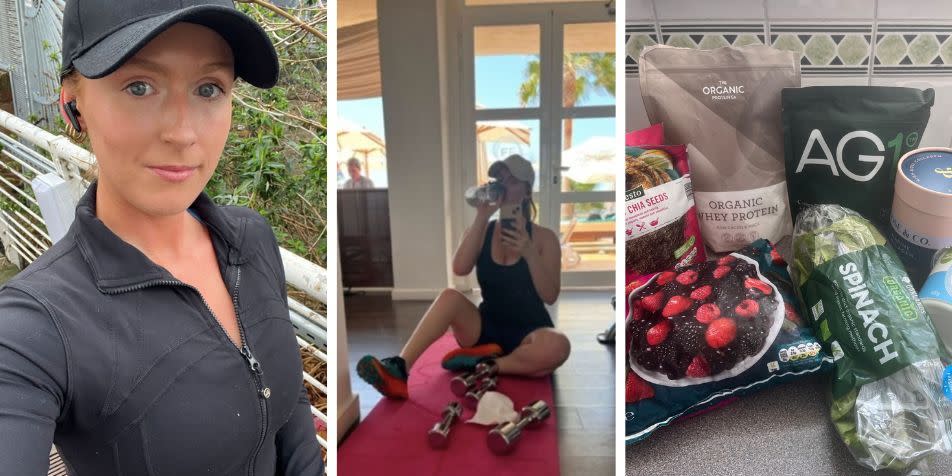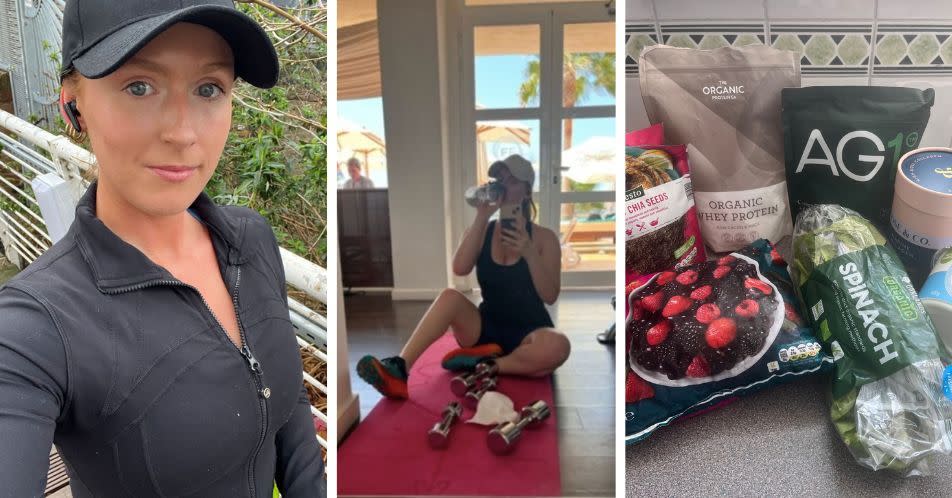‘I completed the 75 Soft Challenge, these are my honest thoughts’

It's no secret we love trying out a fitness challenge at Women's Health. There is the 12-3-30, the 25-7-2, the walking challenge and the formidable (or quite frankly terrifying) 75 Hard Challenge.
Despite being intense, the 75 Hard Challenge piqued my interest because fans waxed lyrical on TikTok about how life-changing it had been for them. Despite these protestations about how rewarding the challenge had been for them, there were an equal amount of experts saying the severe nature of the challenge could do more harm than good.
After a few months of being inconsistent with my workouts and far too accustomed to a cheeky takeaway, I needed a routine shake-up, but I was looking for something less extreme. Then, a few months ago I saw an alternative called the 75 Soft Challenge pop up online, with a less arduous, more sustainable set of rules that far better suited what I was looking for.
What are the rules of the 75 Soft Challenge?
The 75 Soft Challenge comprises four rules, and it is a more realistic alternative to the viral 75 Hard Challenge. The rules are:
Eat well and incorporate more nutritious foods into your diet, and only drink on social occasions.
Train for 45 minutes every day for 75 days. One workout a week should be active recovery.
Drink three litres of water a day.
Read ten pages of any book per day.
What are the rules of the 75 Hard Challenge?
To compare the two viral challenges, it's good to have a grasp of what both challenges require from their participants.
The 75 Hard is (like the name suggests) bloody hard. While the 75 Soft isn’t wildly different from how I lived my life previously, if I was to do the 75 Hard I’d need to change a lot more about my day-to-day routine.
The 75 Hard Challenge rules are:
Stick to a diet of your choice – no alcohol and no ‘cheat meals’.
Do two 45-minute workouts a day with one of them being outside.
Drink 4.5 litres of water every day.
Read ten pages of a self-development non-fiction book every day.
Take a progress picture of your body every day.
The rules of the 75 Hard Challenge also state that if you break one of these rules you will need to start the entire challenge again, while the 75 Soft Challenge has no such stipulation.

75 Soft Challenge benefits
It helped me build a healthy routine
The main benefit for me in undertaking this challenge was having a firm guideline for building a sustainable routine after letting a lot of my healthy habits fall by the wayside at the beginning of the year.
While I still had a relatively healthy routine that consisted of regular exercise and for the most part healthy eating, I was lacking in consistency. I would go to the gym 5 times in one week and then none the next, letting my social calendar dictate my diet and exercise for the week.
It helped me be more conscious of alcohol consumption
I was also drinking more ‘just because’ glasses of wine than I usually would which I could tell was impacting my sleep which then had a knock-on effect of decreasing my energy levels and making it harder to motivate myself to workout or cook a healthy meal at home.
It helped me break out of a reading rut
I’ve been a voracious reader for as long as I can remember and even reading was becoming a habit I was finding it tricky to stick to, scrolling on TikTok before I went to sleep rather than picking up my book.
The 75 Soft Challenge catered well to the areas of my life I felt needed a shake-up at the time, and having a challenge in place helped me focus on getting my wellness habits back into my routine in a sustainable way.
The habits I picked up are sustainable
Unlike the 75 Hard, I didn’t have to stick to a diet, complete two workouts a day, read non-fiction books or drink 4.5 litres of water a day. Any one of those rules would have been hard for me to stick to, with all of them together I would have found it impossible.
I also struggle with body image issues so having to take daily progress photos would not have been good for me, nor would having such strict rules around what I can and can’t eat. The 75 Soft Challenge is far more gentle, sustainable and achievable and is more like a routine reset than an entire life change.
75 Soft Challenge risks
Lucie Cowan, Master Trainer at Third Space advised Women’s Health that it’s always beneficial to approach wellness challenges with a balanced mindset, and gave us three points to consider:
- Safety first: ‘Ensure that the challenge aligns with your current fitness level and health conditions. It's crucial to prioritise safety and avoid pushing yourself too hard, which could lead to injuries.’
- Sustainability: ‘Look for challenges that promote long-term habits rather than short-term, extreme measures. Building a lasting fitness routine is about consistency and finding activities you enjoy and can incorporate into your lifestyle beyond the challenge period.'
- Personalisation: ‘Recognise that everyone's fitness journey is unique. Always customise the challenge to suit your individual needs, preferences, and capabilities. Listen to your body and make adjustments as necessary. No one size fits all, really.'
Jess Hillard, Sports Nutritionist at Warrior also gave us a tip about the water intake. She said that ‘the recommended intake is 1.5-2.5 litres. 3 would also be a great goal but start with trying to reach 2 litres first. Water and hydration needs vary between individuals depending on gender, height, weight, activity levels, temperature and sweat rates. Therefore, you may need more or a bit less than the 3 litres, it will vary hugely.'
Is the 75 Soft Challenge more realistic than the 75 Hard Challenge?
Sports Nutritionist Jess Hillard said that if she was going to recommend either challenge it would be 75 Soft. ‘I would always recommend eating a well-balanced, nutritious diet. ‘Diets’ as such, with restrictions in the ’75 hard’, will only lead to an unhealthy relationship with food and restriction can lead to binge eating that food later.'
Master Trainer Lucie Cowan said the 75 Hard Challenge comes with some significant risks, such as increased injury risk, mental strain, imbalanced training, and a lack of consideration for individual differences.

She said that ‘instead of recommending exercising twice daily for 75 days, it may be more beneficial to focus on designing a well-rounded exercise program [like the 75 Soft Challenge] that includes a variety of workouts, adequate rest and recovery, and addressing individual goals and needs’.
She added that ‘it's important to prioritise quality over quantity, allowing the body time to adapt, recover, and improve gradually. It’s also important to be able to have flexibility within your workout regime to live your best life, be spontaneous and say yes to things.'
5 things I learnt from attempting the 75 Soft Challenge

1. A workout doesn't have to be gruelling to be effective
I love a good, sweaty, tough workout like Barry's and 1Rebel, but because they're so high intensity if I do them too often I start to get fatigued. I knew that in order to keep my exercise routine consistent I'd have to be doing a good array of workouts, so I kept things interesting by switching between running, pilates, strength training and yoga.
I also made use of YouTube for finding a good home workout when I knew I wouldn't have time to make it to the gym, which helped me squeeze in a workout when I was working from home and too busy to go after work.
2. Incorporating small habits will be more effective than overhauling your routine overnight
As I've already mentioned, I would have found the 75 Hard Challenge damn near impossible for me to complete. I have a holistic view of health and fitness and believe that fostering my friendships and familial relationships is just as important as getting my workouts in for an overall healthy life.
In saying that, I can over-prioritise my social life and end up leaving no time to exercise or meal prep, which means I've finished the week wondering where all my time went and didn't do any of the healthy habits I intended to. 75 Soft was a good opportunity to refocus on what's important by adding in some daily routine non-negotiables that I had to stick to.
For those who complete the 75 Hard, if they miss even one of the rules they have to start again, and this all-or-nothing mindset doesn't suit the kind of life I want to lead. During the 75 Soft, if you miss a day you just start again as normal like you would normally. This helped me to build a routine that I'm excited about, and not just counting down the 75 days until I can live my 'normal' life again.
3. Doing the challenge with friends holds you accountable
I convinced my housemate to undertake the challenge with me, and while she got too busy to stick to it after a couple of weeks it was still helpful to have an accountability partner that knew what I was doing and encouraged me to stick to the rules.
We even stuck up post-it notes on our fridge as a daily reminder/countdown that could further motivate us to keep going.
4. Reading has more of an impact on my mental health than I thought
I adore reading and it's always been something that's brought me a lot of joy. However, for some reason this year I've been finding it harder to sit down and pick up my book which has meant I'm pretty far off my goal of reading 25 books this year.
The 75 Soft asks participants to read just 10 pages of a book of their choosing, which was a good motivator because I found I'd tell myself 'it's only 10 pages, just get it out of the way now' and end up reading for an hour before bed most nights. I found that the struggle with reading is getting started, and once I'm doing it I don't want to stop.
Dr Sigrid Lipka, Associate Professor in Psychology at the University of Derby told me it's no coincidence that I've seen positive mental health benefits as there is 'psychological research suggests that regular reading can help us switch off and relax, which in itself can be of benefit for our mental wellbeing. Regular reading for leisure also helps us develop our intellectual skills, imagination, understanding of other people and sense of social connectedness – all of this will benefit our mental health as it makes us more confident and effective when dealing with people and everyday tasks and challenges.'
5. I need to get better at planning my weeks in advance
I'm a sucker for starting my week with the best of intentions, overfilling my calendar and not leaving enough time to do the things I promised myself I would do. This often left me ordering Uber Eats far more than I should and forgoing my evening workout to meet a friend for dinner.
I knew while I was completing the challenge I'd have to be more organised, so I was careful to plan my weeks in advance to make sure I did a morning workout if I planned to be out in the evening. I also made sure I was getting enough sleep during the week so I'd have the energy to exercise, buy groceries, and cook because I find when I'm tired I'm worse at motivating myself to do what I have to do.
Does the 75 Soft Challenge work?
If you feel like some added structure could help you get back into a healthy routine but are wary of intense challenges like the 75 Hard, the 75 Soft could be for you.
While this one is still a 'challenge' technically, it is a more sustainable way of incorporating things into your daily routine and is intended to help you live a more healthy life long term, rather than a short burst of activity that you likely wouldn't continue on with after the challenge is finished.
75 Soft Challenge: FAQs
What is the 75 soft challenge in the UK?
The 75 Soft Challenge in the UK is the same as it is worldwide and follows the same set of rules we outlined above. It's designed to be a healthy undertaking that helps the person completing the challenge to adopt healthy habits that will outlast the 75 days.
Does a walk count for 75 Soft?
Absolutely. The challenge calls for a 45-minute workout six days a week, and what a workout looks like will vary from person to person. Especially if you're early on in your fitness journey, you don't want to overexert yourself by doing six HIIT classes a week and a daily walk may be more sustainable for you.
Do you get a rest day on 75 Soft?
The rules of the 75 Soft challenge stipulate the person undertaking the challenge does six workouts a week with one day for active recovery. Active recovery could look like a yoga session, a swim, or a walk. It's important to listen to your body, however, and if your body is calling for a sedentary day to recover, you should listen to it.
Can you have a cheat meal on 75 Soft?
How you approach this challenge diet-wise is entirely up to you. The rules state that this challenge involves 'eating well and incorporating more nutritious foods into your diet', which could look different for everyone.
At Women's Health we don't believe in an all-or-nothing approach to diet and exercise, and we think a balanced approach to healthy eating that includes all your favourite foods (perhaps in moderation) is more sustainable than cutting everything out at once.
Can you drink on 75 Soft?
The rules of the 75 Soft Challenge call for only drinking on social occasions. This could look different to everyone, however, with many people who do this Challenge eschewing alcohol entirely for the duration.
You Might Also Like


